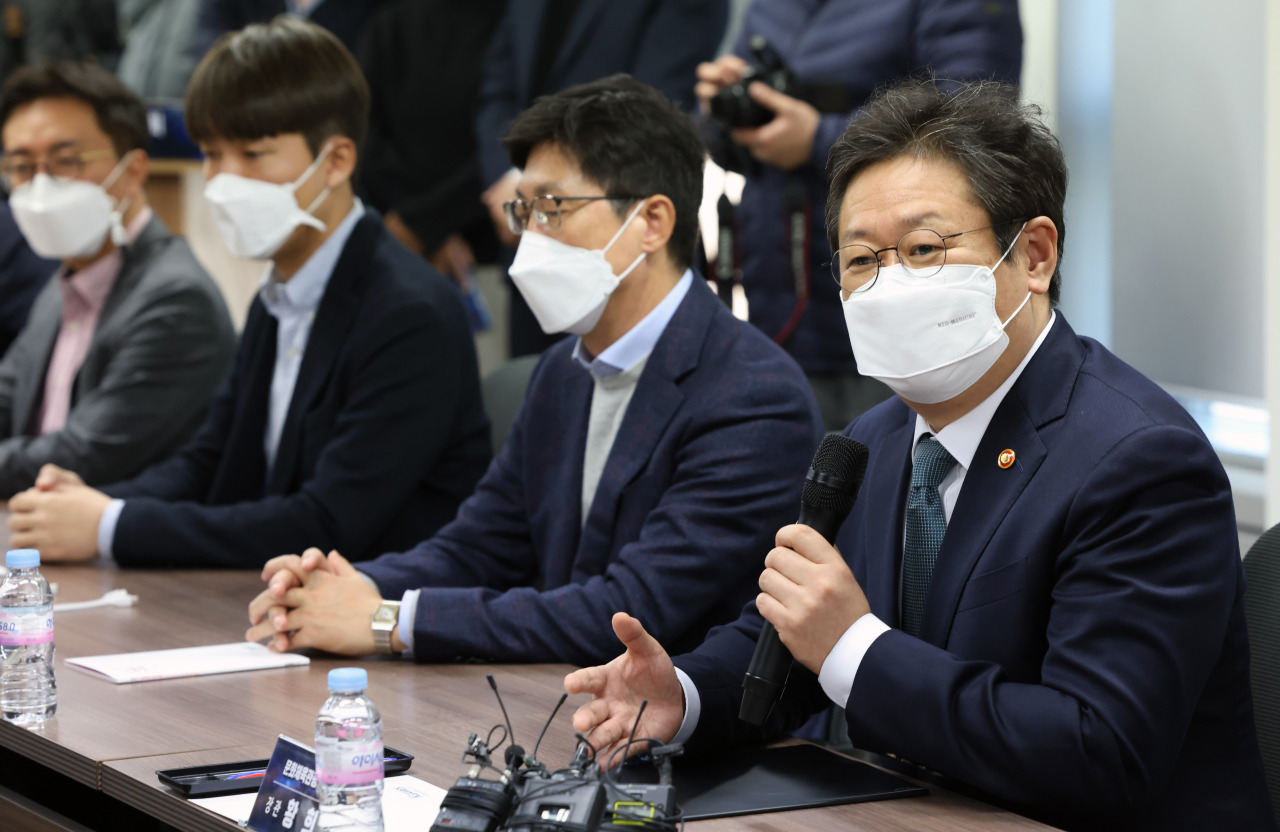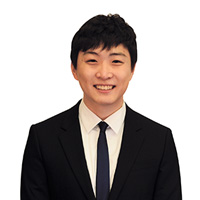Culture Minister Hwang suggests game theme park as way to promote Korean gaming industry
By Lim Jang-wonPublished : March 23, 2021 - 15:39

Meeting with game industry leaders for the first time since assuming office in February, Culture, Sports and Tourism Minister Hwang Hee said the government was keen on promoting the game industry.
“As the Korean economy transitions to non-face-to-face and digital, the gaming industry is showing promise. Games are not only growing in an economical aspect, but are becoming a widespread cultural leisure activity for Koreans,” said Hwang on Monday in his opening remarks before a roundtable discussion at K-Games with the CEOs of leading game companies, including Nexon, Netmarble, NCSOFT, Kakao Games and NHN, as well as members of the Korea Association of Game Industry.
“In order to continue this phenomenon, a healthy gaming culture needs to be set up and a positive perception of games needs to be made. One solution is to create a game theme park that families can enjoy together,” said Hwang.
By experiencing games through virtual reality at the theme park, Hwang said visitors would become more familiar with games, ultimately making South Korea the go-to place for the gaming experience.
The gaming industry has been an essential part of the Korean economy in recent years, having grown last year despite COVID-19.
The Culture Ministry assists the industry in various ways, providing support for the use of new technology and the fostering of new talent. The National Assembly is currently discussing an amendment to the Game Industry Promotion Act that would support the game industry and gaming culture.
Hwang also addressed a number of issues that have been plaguing the gaming industry.
“The users are losing trust in self-regulation, and I fear that this negative perception might spread to local games as a whole. We need to draw up legislation requiring disclosure of probabilities of in-game items to dispel users’ distrust and make the games more competitive,” said Hwang concerning the recent controversy surrounding loot boxes that people purchase in games.
Hwang also addressed the issue of the Chinese government not granting service permission for Korean games. China has not permitted Korean games to operate in China since 2017, with the exception of Summoners War by Com2uS. It was the only Korean game to receive such permission last year, for the first time in three years.
“Many things are changing. This is the year of Korea-China cultural exchange and there is the Beijing Winter Olympics coming up. Also, there is constant discussion of President Xi Jinping visiting Korea, so the situation is getting better,” Hwang said, pledging to use official and unofficial channels to discuss the issue with the Chinese.
Hwang noted that the World Health Organization’s classification of “gaming disorder” as a disease in 2019 could negatively impact the industry if it is applied in Korea. As such, he will take into consideration the opinions of the gaming industry as well as the medical community in responding to the WHO decision.
Finally, regarding the difficulty of implementing the maximum 52-hour workweek, especially during the periods before and after a game’s release, voiced by the game industry, Hwang said he would discuss the matter with the companies and workers to find a solution that would be satisfactory to both sides.
By Lim Jang-won (ljw@heraldcorp.com)
-
Articles by Lim Jang-won








![[Graphic News] More Koreans say they plan long-distance trips this year](http://res.heraldm.com/phpwas/restmb_idxmake.php?idx=644&simg=/content/image/2024/04/17/20240417050828_0.gif&u=)
![[KH Explains] Hyundai's full hybrid edge to pay off amid slow transition to pure EVs](http://res.heraldm.com/phpwas/restmb_idxmake.php?idx=644&simg=/content/image/2024/04/18/20240418050645_0.jpg&u=20240419100350)






![[From the Scene] Monks, Buddhists hail return of remains of Buddhas](http://res.heraldm.com/phpwas/restmb_idxmake.php?idx=652&simg=/content/image/2024/04/19/20240419050617_0.jpg&u=20240419175937)

![[KH Explains] Hyundai's full hybrid edge to pay off amid slow transition to pure EVs](http://res.heraldm.com/phpwas/restmb_idxmake.php?idx=652&simg=/content/image/2024/04/18/20240418050645_0.jpg&u=20240419100350)

![[Today’s K-pop] Illit drops debut single remix](http://res.heraldm.com/phpwas/restmb_idxmake.php?idx=642&simg=/content/image/2024/04/19/20240419050612_0.jpg&u=)